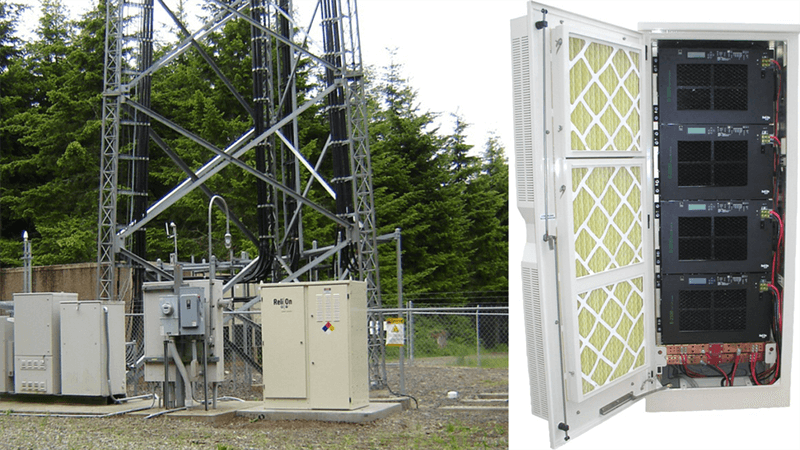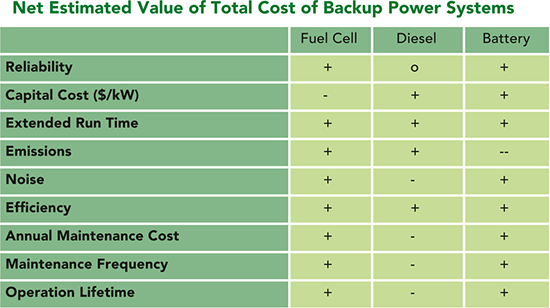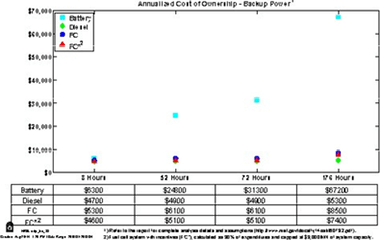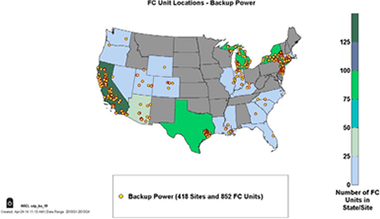Early Markets: Fuel Cells for Backup Power

Overview
Fuel cells convert the chemical energy in hydrogen to electricity with only water and heat as byproducts and are commercially available today for certain applications. One of these is emergency backup power. Today’s commercially available fuel cell backup power (BUP) systems are particularly appropriate for low-power applications (generally up to 10 kW) requiring intermittent backup power when electricity is unavailable from a primary source, such as an electric grid power provider. Between 2009 and 2012, the current and planned BUP deployment count was greater than 2,000 in the United States.1 BUP systems can be used in a wide range of telecommunication, emergency facilities, and data control systems for which backup power is essential.
The Case for Fuel Cells
Backup power technologies currently include fuel cells, batteries, and generators operating on diesel, propane, or gasoline driven internal combustion engines. In a study for the U.S. Department of Energy, Battelle Memorial Institute analyzed lifecycle costs of backup power for wireless towers, comparing 10 kW fuel cell power with other incumbent backup power technologies.2 A complementary analysis studied the annualized cost of ownership of different backup power technologies. The analysis compares 5 kW battery-only, fuel cell, and 25 kW battery-diesel generator backup for annual or continuous runtimes of 8, 52, 72, or 176 hours. In this analysis the fuel cell system with incentives3 (denoted FC* in figures) is cost competitive with the diesel generator, in the 8-hour, 52-hour, and 72-hour runtime scenarios (see Figure 1). In the 72-hour runtime scenario, the cost of ownership of the fuel cell system, without incentives, is approximately 1.2 times higher than that of a diesel generator and more than 5 times lower than that of a battery system. In the same runtime scenario, the cost of ownership of the fuel cell system, with incentives, is approximately equal to that of the diesel generator and more than 6 times lower than that of a battery system.4
Backup power for key infrastructure elements can aid emergency response during major storms or other devastating events and prevent loss of productivity, time, and money for other grid incidents. The number of grid outages in the United States has increased over the last decade with an average outage of approximately 42 hours between 2002 and 2012.5 Fuel cell backup systems operating under real-world conditions have shown continuous runtimes of more than 65 hours. Additionally, a fuel cell system can be remotely monitored and has quieter operation and lower emissions than a battery-diesel generator system.
Key Backup Power Considerations
Practical Use
To provide instant start capability, fuel cell systems are typically paired with a starter battery and include power management and compressed hydrogen fuel storage. Hydrogen can be supplied by delivered bottles, delivered truck, or pipeline or produced on-site. A key advancement for BUP as a result of the American Recovery and Reinvestment Act (ARRA) was the development of a refillable stationary hydrogen storage module and accompanying refueling logistics platform for site accessibility, refuel ease, and decreased delivery costs compared with the cost of replacing empty hydrogen bottles with full ones. Another consideration for these early fuel cell deployments was choosing a site in proximity to hydrogen distribution facilities, which minimized costs associated with refueling, permitting, installation, commissioning, and training.6
Deployment of fuel cell systems is a practical option for telecommunications operations that need reliable, long running backup power at cellular phone signal relay sites, particularly during electric grid power outages.
Commercial growth of the wireless telecommunications market in the United States and overseas provides opportunities for domestic and international sales of backup power fuel cells. Telecommunications backup power expenditures are estimated at more than $2 billion annually.7 Fuel cells for backup power can be installed and operated at new or retro-fit sites in different regions.

U.S. Grid Statistics3
U.S. grid outages in 2002: 22
U.S. grid outages in 2012: 196
Average outage duration: 42 hours
BUP Stats
4-6 kW Average site capacity
852 FCBP systems
1.99MW Total installed capacity
23 States with FCBP units
65hour Demonstrated continuous run-time
99.5% Successful starts out of 2,596


For More Information
For more information, visit http://www. hydrogenandfuelcells.energy.gov.
References and Notes
- DOE Hydrogen and Fuel Cells Program Record #14009. http://hydrogen.energy.gov/pdfs/14009_industry_bup_deploy-ments.pdf.
- Identification and Characterization of Near-term Direct Hydrogen Proton Exchange Membrane Fuel Cell Markets, Battelle Memorial Institute (April 2007).
- “The credit is equal to 30% of expenditures, with no maximum credit. However, the credit for fuel cells is capped at $1,500 per 0.5 kilowatt (kW) of capacity. Eligible property includes fuel cells with a minimum capacity of 0.5 kW that have an electricity-only generation efficiency of 30% or higher.”
- Kurtz, J., Saur, G., Sprik, S., Ainscough, C., “Backup Power Cost of Ownership and Incumbent Technology Comparison.” October 2014. http://www.nrel.gov/docs/fy14osti/60732.pdf
- Electric Disturbance Events (OE-417) Annual Summaries 2002-2012
- Kenny, Kevin. 2011. “XII.5 Demonstrating Economic and Operational Viability of 72-Hour Hydrogen PEM Fuel Cell Systems to Support Emergency Communications on the Sprint Nextel Network., FY2011 Annual Progress Report, U.S. Department of Energy, Hydrogen and Fuel Cells Program.
- Kevin Colbow, Director, Product Management and Solutions Engineering, Ballard Power Systems,“Fuel Cells in Extended Duration Emergency Backup Power” October 2010. http://www.fuelcellseminar.com/media/5229/dem42- 1_colbow.pdf http://www.nrel.gov/hydrogen/cfm/images/cdp_bu_19_deploymentsites.jpg